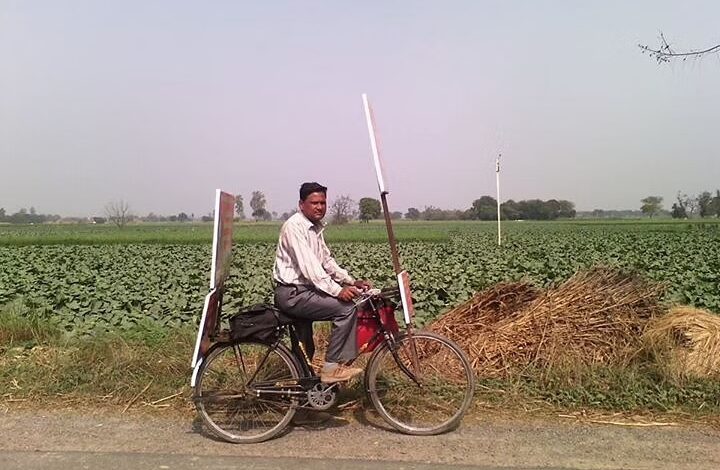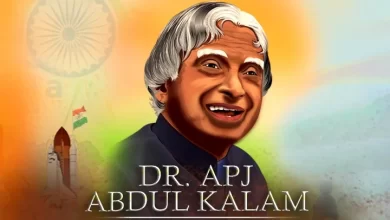Aditya Kumar

Aditya Kumar’s unique mobile cycle school is almost like a landmark of Lucknow— visible in slums and streets every day. For the last 18 years, without charging even one paisa, Aditya has been giving tuitions to slum children, who have never been to a classroom. All his tools of teaching are carried on his bicycle as he pedals 50 to 60 km a day, teaching in five to six locations, from 10.00 am to 7.00 pm.
While the slum children are taught in Hindi, he takes English lessons for youth aspiring to enter the job market. He is a traveling teacher who does not need a classroom. While cycling around the city he looks out for children on streets who show an interest in learning English. Extremely poor himself, his passion to help the poorest with education has sustained him. Sometimes, he does not even have money to get his cycle repaired, but some Good Samaritan helps him out.
This frail man has something in common with the Samajwadi Party (SP) government in Uttar Pradesh. He rides a bicycle, which is the election symbol of the Samajwadi Party (SP); and he offers free education — a much-hyped programme of the state government. But the similarities end there. Kumar launched ‘Aditya ki Shiksha Kranti ‘almost two decades ago, in an effort to teach English to youngsters who could not afford conversation classes. Interestingly he now has many keen students from the shanties, who are improving their English.
A graduate of science from DAV College, Kanpur, Kumar comes from a poverty stricken family. While in school, he worked as a labourer and simultaneously finished his education. “Twelve days in a month I went to school and the rest of the days I worked as a labourer on construction sites. My teachers supported me and admired me for my dedication towards learning,” added Kumar.
Hailing from Salempur village of Kayamganj area in Farrukhabad, Kumar left his village of 400 residents in 1992 and came to Kanpur. His motive was to “get the fear of English” out of the minds of students. Kumar said that while he was studying for B.Sc, he feared the “angrezi” (English) in which he was expected to be conversant. The fear always chased him; so much so that he decided to take it “head on”.
He decided not only overcome the fear of English himself but also teach English to slum-dwelling kids. By 1995, he was the owner of a second-hand bicycle. He had learnt to “read and write good English”. Soon, he started an “English-speaking school”, which would run mostly on his bicycle. .
Life was not easy when he first came to Lucknow to earn a living. For a month he lived on the Charbagh railway station that became his second home. Right there students collected around him and he tutored them. In due course those students who could not afford to pay a fee but wanted to learn English also came. Initially he refused to teach without being paid. “But each time I refused a student I felt bad. One day I just decided to teach everyone who wanted to learn English” Kumar adds with a smile.
“What sir is doing for us is without parallel. No one will teach anyone for free, but he is doing it. Every day without fail, he teaches us. Today if you don’t know English you won’t get a good job. Sir is helping us to realize our dream,” said Rishi Chaudhary, who is preparing for an examination for the post of a probationary officer in a bank.
“Where ever I got students, I would sit and teach — by the roadside, in parks, near slums. I had a board on the cycle, and students would just read it and stop me. I was one of them, I understood what it meant to be poor and without support,” Aditya says, with a grim expression. Aspiring to be a bureaucrat and join the Indian Administrative Service or the Provincial Civil Services, he settled for taking tuitions, for a fee of Rs.300 per month in Kanpur.
Having pedaled in Kanpur and then in Lucknow for a lakh kilometers or more by now, he says he has faced rough times. He has been the target of violence, and people have been suspicious and beaten him up for sitting with a bunch of boys and girls along roadsides.” Then I put up a small board on the cycle, announcing – ‘Aditya Master Saheb’. Things have improved, and on and off there are even people who tip me with Rs.100 or so for food and tea.”
Living in a room that is just five feet square at Nishatganj that was offered to him by a compassionate man, Aditya remarks on life’s ironies: When he first began, he had no students. These days, he has no dearth of students, as girls especially, flock around him to learn English in the hope of finding work at call centers and as receptionists. But most of them can’t afford to pay any fees!
It is ironical that the state government spends crores of rupees on education, but cannot offer him support, despite his unrelenting campaign to educate poor kids from slums. Having made several futile attempts to meet Chief Minister Akhilesh Yadav and his officials, Kumar says he is now fed up of standing in long, serpentine queues.












